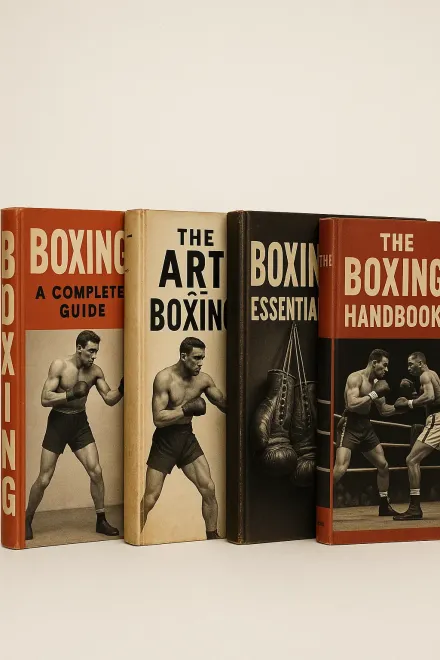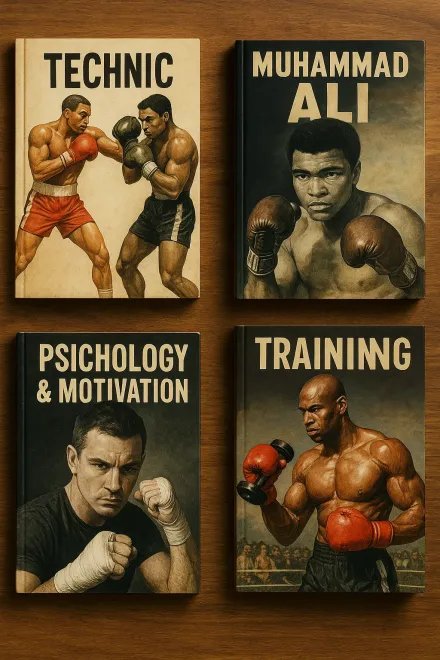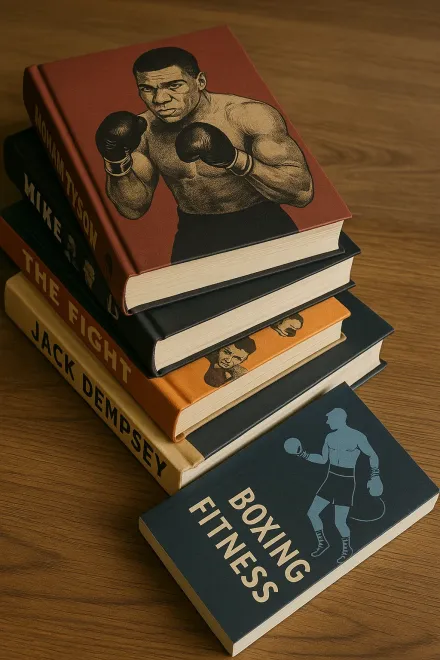Books on Boxing
Boxing is much more than a contact sport; it is a discipline that blends technique, strategy, history and values like perseverance and respect. For those who want to dive into this world, books on boxing are an invaluable source of knowledge. Whether you are a beginner seeking to understand training basics, a fan who wants to learn the history of great champions or a pro looking to improve technique, reading is a resource that never fails.
Over the years, texts have been published ranging from technical manuals to inspiring biographies. Reading about boxing brings you closer to the sport from a practical perspective, and also to the mindset around it: self-improvement, respect for your opponent and the constant pursuit of excellence.
See on Amazon the best selection of boxing books
Why read books about boxing?
There are many reasons why a boxing fan or practitioner should turn to specialized books. First, these texts offer a detailed view of technical aspects that are often not explained with the same depth in the gym. Manuals on movements, combinations, defenses and strategies are resources that let a boxer improve even outside the ring.
Second, boxing books are an endless source of motivation. Biographies of champions like Muhammad Ali, Mike Tyson or Roberto Durán tell stories of effort, perseverance and glory that inspire anyone. In addition, reading is an excellent way to understand the psychology of boxing, that is, the mindset that sets a good fighter apart from a champion.
Finally, many titles focus on boxing's history, recounting how this sport has evolved over the centuries and how it has influenced popular culture. These books allow you to appreciate boxing not only as a sport, but also as a cultural and social phenomenon.
Most popular types of boxing books
When we talk about boxing books, not all follow the same line. They can be classified into different categories depending on the approach and target audience. Some of the most notable are:
- Technical manual: They explain in detail punches, combinations, defensive positions and training routines. They are very useful for those who want to learn or refine their style.
- Biographies: Stories of the lives of great boxers like Muhammad Ali, Mike Tyson, Sugar Ray Leonard or Manny Pacquiao. Beyond the sport, they show the human side of these idols.
- History of boxing: Texts that trace the origins of the sport, its key moments and how it has changed over the decades.
- Psychology and motivation: Works that delve into the fighter's mindset, emotion control and mental preparation for competition.
- Physical training: Guides that include strength, cardio and nutrition routines specifically for boxing.
The variety of options means there is always a suitable book for every reader, whether an athlete, a coach or a passionate lover of the squared circle.


Examples of must-read boxing books
Over time, books have been published that are considered true benchmarks in the boxing world. Some examples include:
- 'The Greatest: My Own Story' by Muhammad Ali: A book that lets you step into the mind of the most iconic boxer of all time.
- 'Iron Ambition' by Mike Tyson: A work in which Tyson recounts how his trainer, Cus D'Amato, transformed his life and career.
- 'The Fight' by Norman Mailer: A gripping chronicle of the historic Ali–Foreman clash in Zaire.
- 'In the Ring with Jack Dempsey' by Adam Pollack: An exhaustive investigation into the life and career of one of the most legendary champions.
- 'Boxing Fitness' by Ian Oliver: A perfect manual for those who want to train like boxers without needing to compete professionally.
These titles are just a sample, but they reflect the richness and diversity of approaches found in boxing literature.
How to choose the best boxing book for you
Choosing a good boxing book largely depends on what you are looking for. If your goal is to improve your performance in the ring, a technical manual or training guide is the best option. These texts explain step by step how to execute movements, correct common errors and design effective routines.
On the other hand, if you want motivation and inspiration, boxer biographies are the most suitable choice. They show the sacrifices, challenges and victories of great champions, which can drive you toward your own personal or athletic goals.
If you are a history lover, there are books that narrate boxing's beginnings, from bouts in ancient Greece to the sport's professionalization in the 20th century. These titles are ideal for those who enjoy a more cultural and social approach.
Finally, do not forget to consider the book's level of depth. Some are designed for beginners, while others require prior knowledge of techniques or boxing history. Checking reviews and opinions from other readers is a practical way to ensure the chosen book meets your expectations.
In short, before deciding, ask yourself: do I want to learn technique, improve fitness, get inspired by real stories or understand the sport's evolution? The answer will guide your choice.
Tips to get the most from boxing books
Reading boxing books can be an enriching experience, but to get the most out of it, it is worth following some practical tips:
- Complement reading with practice: If you are reading a technical manual, apply the movements in your training. Theory sticks better when paired with action.
- Take notes: Highlight key ideas, motivational phrases or training tips you can apply day to day.
- Get inspired by biographies: Many boxers faced huge difficulties before reaching glory. Their stories can guide you in overcoming personal obstacles.
- Do not stick to a single approach: Alternate between technical, historical and motivational books. This way you will have a more complete view of boxing.
- Discuss with others: If you belong to a gym or training group, share what you have learned. This fosters debate and enriches collective knowledge.
Reading, combined with practice and reflection, turns books into a powerful tool. You will not only learn to improve your skills in the ring, but also better understand the cultural, historical and human value boxing represents.
Frequently asked questions about boxing books
What kind of boxing book suits me if I'm just starting?
If you are a beginner, it is best to start with a basic or introductory technical manual. These books clearly explain essential movements, correct posture, defenses and basic combinations. They also usually include illustrations or photos that make learning easier. Avoid starting with overly advanced texts or lengthy biographies if your goal is to grasp the technique first.
Are boxer biographies useful for training?
Biographies do not replace training manuals, but they are extremely useful for motivation. Reading about the sacrifices, defeats and victories of champions like Muhammad Ali or Mike Tyson can inspire you to give your best. In addition, many biographies include anecdotes about training routines and mental preparation, which adds value for those who practice boxing.
Are there recommended boxing books in Spanish?
Yes, there are excellent titles in Spanish. These include translations of major international works and texts written by Spanish-speaking authors. For example, there are biographies of Latin American boxers like Julio César Chávez or Roberto Durán. You can also find training manuals and boxing history books tailored to Spanish-speaking readers.
Can a book help me improve my boxing technique?
A book alone will not make you an expert, but it is a valuable tool to complement your training. Manuals explain technical fundamentals in detail and offer practical tips to refine movements. However, it is important to take theory into practice at the gym, preferably under a coach who can correct mistakes.
What's the difference between a boxing manual and a boxing fitness book?
A boxing manual focuses on technique, explaining punches, defenses, strategies and tactics inside the ring. In contrast, a boxing fitness book focuses on physical preparation, with strength, endurance, speed and nutrition routines. Both are useful, but they serve different purposes. Ideally, combine them for a more complete training plan.
Is it worth reading old boxing books?
Yes, old boxing books have great historical value. Although some techniques may have evolved, many basic principles remain current. They also show how boxing was understood in past eras and help you appreciate the sport's evolution. For lovers of boxing history and culture, they are essential reading.
Can I learn boxing only from books?
It is not advisable to learn boxing solely from books. Reading can give you an excellent theoretical base, but boxing requires practice, posture correction, reflexes and real contact. Books are a very useful support, but the most effective approach is to combine them with guided training at a gym and, if possible, with a specialized coach.
